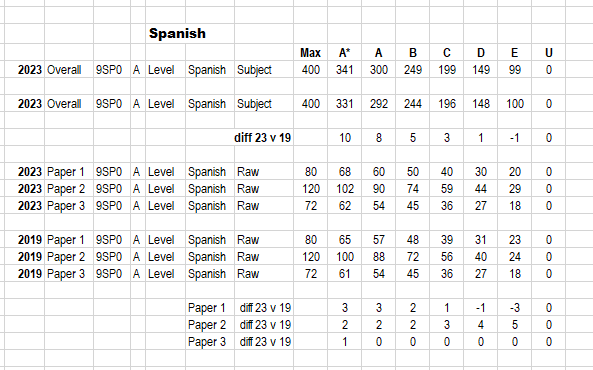This post about grade boundaries is in the context of Ofqual’s decision to return to 2019 grading in 2023.
There has been discussion on social media about the grade boundaries in AL Fr, Gn and Sp, and so David Blow, ALL Fellow, who has done much statistical analysis for the ML community has prepared the description below and this spreadsheet. (Stored on my Google Drive).
There is often much confusion in the media about grade boundaries and standards and the number of grades awarded, and how “comparable outcomes” works in practice to ensure that there is consistency from one year to the next in each subject. It should be normal for there to be variations from year to year in grade boundaries to reflect the increase or decrease in difficulty of particular exam papers depending on the precise questions which happen to have been set that year. It is important to stress that this is nothing to do with “severe grading”. The latter is whereby in subjects such GCSE ML, systematically, arising from a historical anomaly, students on average get half a grade lower in their GCSE ML compared with their other EBacc subjects, leading to a false perception that they are not as good at ML as other subjects. This is explained more fully on the ALL London site here.
2023 saw the return to "normal" i.e. pre-pandemic
grading at both AL and GCSE.
https://www.gov.uk/government/news/guide-to-as-and-a-level-results-for-england-summer-2023
Ofqual has said:
“Exam boards have set grade boundaries this summer based on a combination of
qualitative and quantitative evidence. As in previous years when exams took
place, there has been an important role for examiner judgement in reviewing the
quality of students’ work.
In all three subjects, there was a higher percentage of
"top" (A* & A) grades awarded in 2023 than 2019. The FFT
Datalab analysis
on the second page as a graphic shows for all subjects how
the percentage of top grades has varied since 2019, and how they have all
returned close to 2019.
I've produced a spreadsheet where I've drawn together the relevant information from AQA, Edexcel and JCQ websites regarding the A-level exams in French, German and Spanish. You'll see from the figures in the spreadsheet just how complex the situation is.
The spreadsheet can be downloaded here
Screenshots from each tab are pasted below the commentary for each one.








No comments:
Post a Comment